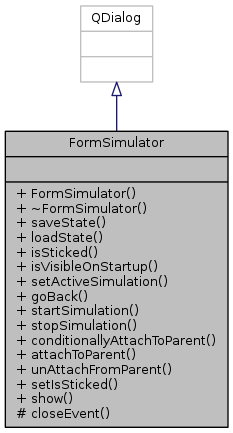 |
BuildmLearn Toolkit
2.0.4
BuildmLearn Toolkit is an easy-to-use program that helps users make mobile apps without any knowledge of application development.
|
 |
BuildmLearn Toolkit
2.0.4
BuildmLearn Toolkit is an easy-to-use program that helps users make mobile apps without any knowledge of application development.
|
Separate window which contains active simulator. More...
#include <formsimulator.h>

Public Slots | |
| void | goBack () |
| Takes active simulation one step back. More... | |
| void | startSimulation () |
| Starts active simulation. More... | |
| void | stopSimulation () |
| Stops active simulation. More... | |
| void | conditionallyAttachToParent () |
| Conditionally sticks simulator window to its parent. More... | |
| void | attachToParent () |
| Forces this window to align itself next to its parent window. | |
| void | unAttachFromParent () |
| Allows window to be unattached and allows vertical resize policy. | |
| void | setIsSticked (bool is_sticked) |
| Sticks or unsticks window. More... | |
| void | show () |
| Displays simulator window. | |
Signals | |
| void | closed () |
| Emitted when simulator window is closed. | |
| void | stopEnableChanged (bool enabled) |
| Emitted if "stop" feature for active simulation is changed, in other words, if simulation is started/stopped. | |
Public Member Functions | |
| FormSimulator (FormMain *parent=0) | |
| void | saveState () |
| Saves size & position for the window into settings. | |
| void | loadState () |
| Loads size & position for the window from settings. | |
| bool | isSticked () const |
| Indicates whether simulator window is sticked to main window or not. More... | |
| bool | isVisibleOnStartup () const |
| Indicates whether simulator window should be shown when application launches. | |
| void | setActiveSimulation (TemplateSimulator *simulation) |
| Sets new active simulation widget. More... | |
Protected Member Functions | |
| void | closeEvent (QCloseEvent *e) |
| Executed when simulator window is closed. More... | |
Friends | |
| class | FormMain |
Separate window which contains active simulator.
Definition at line 19 of file formsimulator.h.
|
protected |
Executed when simulator window is closed.
| e | Event argument. |
Definition at line 160 of file formsimulator.cpp.
|
slot |
Conditionally sticks simulator window to its parent.
Definition at line 105 of file formsimulator.cpp.


|
slot |
Takes active simulation one step back.
This simply calls TemplateSimulator::goBack().
Definition at line 83 of file formsimulator.cpp.

|
inline |
Indicates whether simulator window is sticked to main window or not.
Definition at line 39 of file formsimulator.h.

| void FormSimulator::setActiveSimulation | ( | TemplateSimulator * | simulation | ) |
Sets new active simulation widget.
| simulation | New active simulation widget. |
Definition at line 60 of file formsimulator.cpp.

|
slot |
Sticks or unsticks window.
| is_sticked | Do we want to stick window? |
Definition at line 111 of file formsimulator.cpp.

|
slot |
Starts active simulation.
This simply calls TemplateSimulator::startSimulation().
Definition at line 89 of file formsimulator.cpp.

|
slot |
Stops active simulation.
This simply calls TemplateSimulator::stopSimulation().
Definition at line 97 of file formsimulator.cpp.
